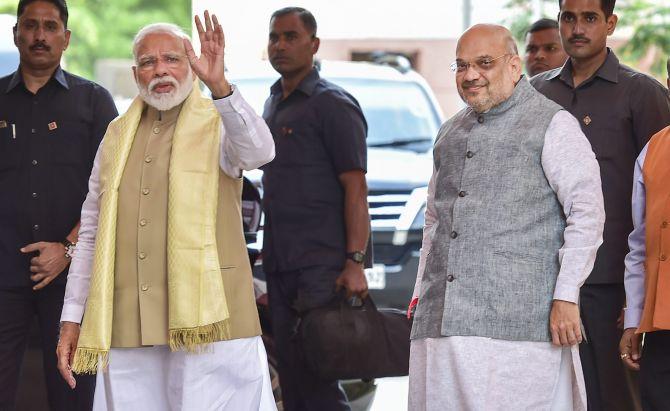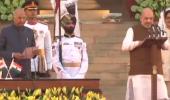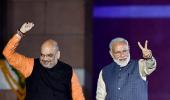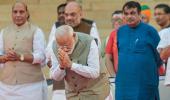'Mr Modi's next challenger/s will need to invent a new politics,' says Shekhar Gupta.

An epoch has ended in Indian politics exactly after three decades. A new one has begun.
We are certainly not talking about the decline of the Nehru-Gandhi dynasty and the rise of Narendra Damodardas Modi as the solitary new pole of Indian politics. That would be too narrow a focus to understand the profound political transformation in India.
We are marking the end of the Mandal-Mandir politics and the unfolding of the Modi epoch.
It was exactly around this time of the year in 1989 that the BJP, reduced to two in the Lok Sabha by Rajiv Gandhi in 1984, had begun to see a chance for a comeback in the last year of his prime ministership.
Rajiv confidant and defence minister V P Singh had rebelled, and looked the natural leader for an alliance to replace Rajiv. But he could not have done it without the BJP's numbers. And L K Advani, the BJP's sharpest mind, wasn't willing to accept having to share power forever.
He wanted the BJP to win power on its own. For this, the BJP needed an agenda going beyond the day's flavour: Defeating 'corrupt' Rajiv.
He picked up Ayodhya, combining aggressive nationalism with Hindu revival. This was his Mandir doctrine.
Mr Advani helped the Opposition stop Rajiv well short later that year. V P Singh, whose Janata Dal won 143 seats, most of these in the heartland, was sworn in as prime minister of a newly-formed National Front coalition. It was still way short of 272.
The numbers were made up by two unlikely outside supporters -- the Left and the BJP. It wasn't actually the first or the last time the two sworn ideological enemies cynically made common cause.
The bulk of the Janata Dal and its smaller allies's numbers came from old Socialists and Congress rebels. Generally, they detested the BJP.
Mutual unease worsened with differences over the handling of a new insurgency in Kashmir, especially after Rubaiya Sayeed, the daughter of Mufti Mohammad Sayeed, the Kashmiri politician serving as home minister in V P Singh's Cabinet, was kidnapped for ransom by Kasmiri separatists and the government capitulated.
Singh and his mostly Socialist/Lohiaite think-tank knew the arrangement was unsustainable and worked to build a new politics opposed to both the BJP and the Congress. An almost decade-old report of the Mandal Commission, recommending reservations for Other Backward Classes, was pulled out and implemented in a jiffy.
The upper castes, already resentful of the 22.5 per cent reservations for scheduled castes and tribes, declared war on V P Singh, leading to violent disturbances.
In these, 159 upper caste students tried to commit suicide and, unfortunately, 63 succeeded.
A caste war had begun within the Hindu mass.
In the process, V P Singh and his socialists built a new OBC vote bank. It threatened the BJP by dividing the Hindu vote it coveted, the last thing Mr Advani wanted when he was trying to polarise that entire population on a Hindu-Muslim basis.
V P Singh's 'Mandal' strategy ran headlong into Advani's 'Mandir'.
The Mandal versus Mandir politics resulted in a tussle that has defined Indian politics since then: Can you re-unite by faith what caste divided?
When it worked, which was less often, the BJP came to power. But mostly, bonds of caste prevailed, particularly as many old heartland leaders built and reinforced vote banks of their own castes.
Kanshi Ram and Mayawati joined the mix too, taking away the Dalits. Muslims were these caste groups's force multipliers, and vice versa.
Together, they often beat the BJP in the heartland. And nationally, these joined hands with the Congress to build unlikely coalitions to keep the BJP out of power.
The 2019 verdict has ended that. To say that Mandir has triumphed Mandal will miss the point. It is more like Mandir, under Narendra Damodardas Modi and Amit Anilchandra Shah, has subsumed Mandal.
Helped along by Mr Modi's rise as India's first full-term, full-majority OBC prime minister winning a second term, the Mandalite vote banks are broken.
Mr Modi has taken the mantle from both Mandal and Mandir.
In terms of political geology, this isn't just a tectonic shift, it is a continental collision.
How has it come about?
What are its consequences?
And what will it take to contest it, and invent a new pole in Indian politics?
Cut to Mr Modi's spirited speech to his party men in the evening of the results. Two points he made stand out. One, he said there were only two castes in India now: The poor, and those able to generate the resources to help the poor.
Second, that those who wore the 'secular mask' have been defeated. The political message is that the time when leaders could divide Hindus on the basis of caste, combine with Muslim voters and stay in power is now over.
Mr Modi is the solitary factor that made this possible. There is no point blaming the Opposition.
Pre-poll coalitions work when you are fighting an ideology or a party. They will be easily rolled over when fighting a personality, particularly one as popular as Mr Modi today, or Indira Gandhi in 1971.
Mr Modi and Mr Shah have dared to take the BJP where Mr Advani and his generation had not dreamed. Their Mandir polarisation was read by the heartland voters with their evident sympathy with the upper-caste anti-Mandal suicide-burners. Mr Modi and Mr Shah have actively reached out to the OBCs and Dalits.
In Uttar Pradesh, they have been breaching both Mayawati and Mulayam's vote banks, diminishing them essentially to single-caste leaders, Jatavs and Yadavs, respectively.
The rest are gravitating towards the BJP. Since it already has a Hindu nationalist upper caste vote-bank, these additional numbers give it devastating power.
Bihar has been handed over to a non-BJP OBC leader (Nitish Kumar), the leader of a large and powerful Dalit group, Ram Vilas Paswan, has been accommodated.
The challenge of Mandal, which kept the BJP out of power for almost two decades of the past three, was put to flames in 2019.
Mr Modi now has the opportunity to design his own playbook. Here is one likelihood. Because he can take the upper-caste loyalty for granted for now, he could empower many more OBC and Dalit leaders at the Centre and in the states.
In Bihar, he is already building a strong set of Yadav leaders, notably Sanjay Paswan, and some will be mentored in UP too. And Hindus feel sufficiently empowered under him so he could reach out to Muslims too.
The message: The time when all of you could combine your vote shares to win power is over. The politics that gave you your electoral clout has ended. So come under my tent.
After all, as I said, there are only two castes in my India, the poor and the wealth-creators. Most Muslims may still not walk in. But some might just.
Do not read this as the end of politics in India. It is just that, with the Mandal-Mandir epoch over, Mr Modi's next challenger/s will need to invent a new politics. Of course, some would still hope that caste would once again divide what faith reunited. But I'd believe that half the life of that idea ended in 2014, and the rest now.
How would that new politics be built, and possibly by whom?
Look one level below the surface in this election result. Under the BJP's 303 and 52 of the Congress are two important numbers. The BJP's votes have risen to 226 million now from 171 million in 2014. The Congress vote has also risen to 118.6 million from 106.9 million.
The combined 2014 tally of 277.9 million between them has now risen to 344.6 million. In percentage terms, this is 57 per cent of the total vote compared to 50.3 in 2014.
The vote Mandalite and other regional forces took away is gravitating back to national parties.
That's why you may take the Congress lightly, Mr Modi and Mr Shah won't.
By Special Arrangement with The Print












 © 2025
© 2025